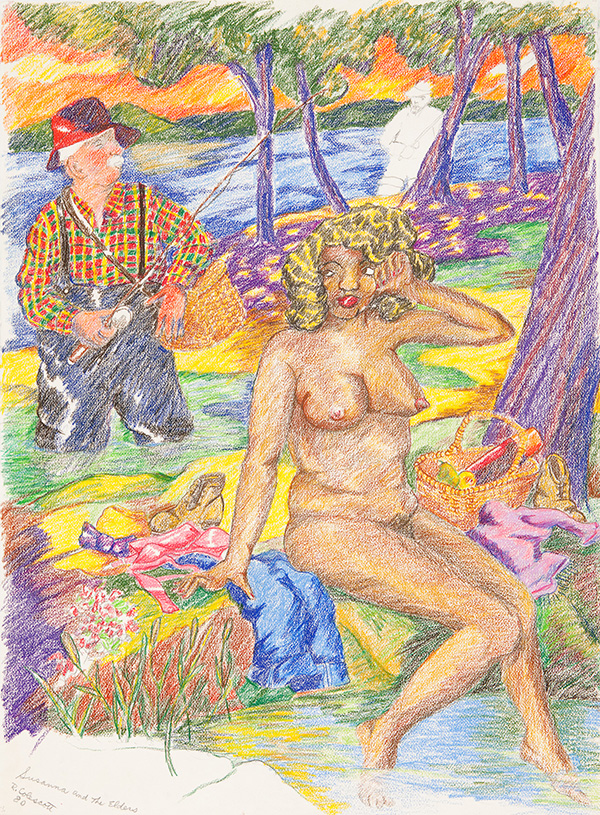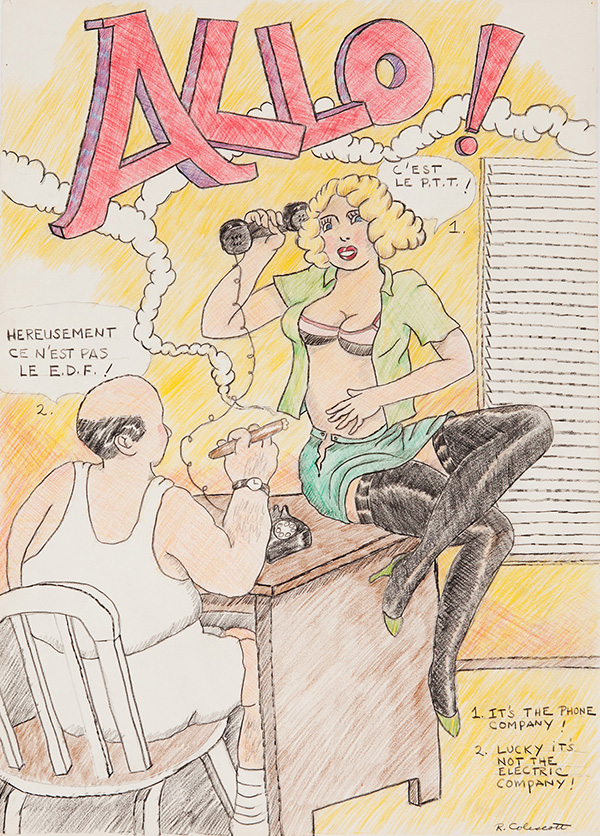ART CITIES:Los Angeles -Robert Colescott, Part I
 Like many brilliant artists, Robert Colescott was a complicated man. He explored the social questions of our times with both seriousness and wit. His controversial topics ranged from the mundane to the profound, touching on race, history, sex, and power. The work for which Colescott became especially well known are expressive, cartoon-like portrayals of American slices of life that contain poignant and thought-provoking images using vibrant color. He explored a distinctive version of popular culture, using references to art history, religion, and literary sources (Part II).
Like many brilliant artists, Robert Colescott was a complicated man. He explored the social questions of our times with both seriousness and wit. His controversial topics ranged from the mundane to the profound, touching on race, history, sex, and power. The work for which Colescott became especially well known are expressive, cartoon-like portrayals of American slices of life that contain poignant and thought-provoking images using vibrant color. He explored a distinctive version of popular culture, using references to art history, religion, and literary sources (Part II).
By Efi Michalarou
Photo: Blum & Poe Gallery Archive
Αn exhibition of paintings and drawings by Robert Colescott is on presentation at Blum & Poe Gallery In Los Angeles. Over a nearly 60 year career, Robert Colescott established himself as a singular voice in American painting. With his distinctive style of figuration, Colescott laid bare issues of systemic racism and the omission of black subjects within the genre of history painting, offering up a disturbing yet poignant critique of male chauvinism, sexual misconduct, and interracial relationships. The exhibition is organized thematically, with individual galleries dedicated to many of these subjects that permeated Colescott’s work for much of his life. Works on view foregrounding Colescott’s interest in politics and current affairs include “Kitchen Assassination” (1971), a chaotic composition depicting the 1968 shooting of Robert F. Kennedy at the Ambassador Hotel, and its corresponding painting, “Assassin Down” (1968-70), illustrating the shooting of Lee Harvey Oswald. These works, along with more historical representations of war and strife, such as “El Mahdi” (1968-70) and “Pancho Villa” (1971), illustrate Colescott’s attraction not only to his own American story, but also to the stories and histories of other cultures. Beginning in the 1970s, while holding various teaching positions in the Bay Area and Pacific Northwest, Colescott focused his attention repeatedly on the subject of sex, specifically interracial relations and the perceived power dynamic between men and women of that time. These issuesviewed now forty years later, have proven to be tremendously topical and relevant in this moment of national reckoning. By fearlessly appropriating masterworks from art history and offering a revisionist narrative with black men and women in positions of prominence, Colescott subverted centuries of preconceived tradition in Western culture. On view are key works from Colescott’s “Bathers” series (1984-85), which place black protagonists into the foreground of classical turn of the century paintings. For much of the 1970s, ‘80s and into the ‘90s, Colescott would offer this reassessment of art history in such iconic works as “George Washington Carver Crossing the Delaware: Page from an American History Textbook” (1975). Here, Colescott upends Emanuel Leutze’s famous 1851 portrait of George Washington, recasting the expedition with a black Carver at the helm of the boat in Washington’s stead. In 1997, Robert Colescott was honored as the first African American artist to represent the United States with a solo exhibition at the 47th Venice Biennale.
Info: Blum & Poe Gallery, 2727 La Cienega Blvd, Los Angeles, Duration 10/3-28/4/18, Days & Hours: Tue-Sat 10:00-18:00, www.blumandpoe.com









